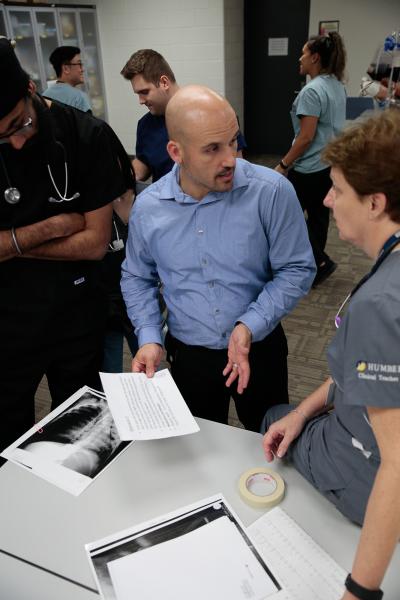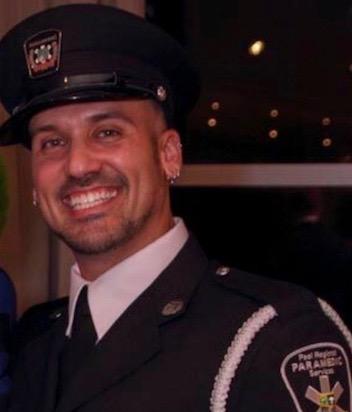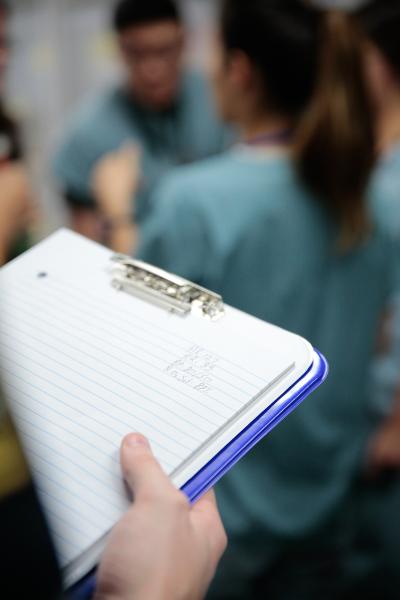The GTA is experiencing a new COVID-19 related phenomenon, and Richard Alvarez is tired of it. People worried about symptoms like coughing and shortness of breath call 911 for help – and lie.
The dispatcher doesn’t have enough information to warn the responding paramedics.
 “I think they fear that if they answer honestly that they’ve traveled or been exposed to someone who has traveled or has positive symptoms, that we won’t come,” he said.
“I think they fear that if they answer honestly that they’ve traveled or been exposed to someone who has traveled or has positive symptoms, that we won’t come,” he said.
The paramedics do come.
Part-time paramedic and Humber College Paramedic program professor Richard Alvarez wakes up the morning of every shift ready to face the COVID-29 pandemic. He’s more determined than scared. Still, he respects the risk.
He and his colleagues at the Peel Regional Paramedic Services wear masks, gloves, and other protective equipment in addition to their usual gear. The equipment is crucial for protection from COVID-19, which is easily spread by respiratory droplets when someone infected coughs or sneezes.
An opportunity to educate
The number of positive cases changes daily in Ontario and Richard Alvarez and his colleagues are prepared to pivot when they need to.
“Day to day, it's tough because some days the hospitals look empty and then other days it looks like a mad house,” he said.
Alvarez graduated from Humber in 2002. He says his professors prepared him for the extensive safety measures he now employs. Now, in his role as a professor in the paramedic program, he teaches his own pupils to protect themselves in the field.
He wishes the general public would be so receptive.
“I really don’t think people will get it until it actually, personally affects them. If they have a family member who gets sick, or they themselves get sick.”
Many of the people he treats fail to grasp the concept of decreasing community spread.
“That’s the most frustrating piece. Please stay home.”
Innovating hands-on learning
Alvarez and his colleagues were already finding ways to incorporate remote learning into their programs before the decision to close Humber College campuses.
“I think it may have accelerated this process,” he said.
Lifting, injections, and other hands-on skills can’t be demonstrated remotely, but for some classes and skills, online instruction can be very effective.
“We can upload videos of certain skills and the students would come to class and we’d have a sequence of checklists saying OK, I read the article, I watched the videos. I can perform this skill.”
He notes that with the current necessity of remote learning, there is plenty of time to refine teaching methods.
Humber College has ensured that any learning outcomes requiring lab access, like hands-on paramedic training, can be addressed by faculty-led online learning and video tutorials like the ones Alvarez describes. Otherwise, completion of skills can occur in subsequent semesters or be delivered through another appropriate means identified by instructors and faculty. Work-integrated-learning options will be assessed by placement advisors.
Alvarez employs innovative teaching and advocates for the safety of others when he’s “on the road” as a paramedic. He embodies key mindsets and skills that set Humber College graduates apart from their peers.
After every long and stressful shift, he returns home to his family,
“I bag my entire uniform in a biohazard bag which the service supplies for employees. I make sure that I shower at work,” he said.
“The clothes are in bags, but I’ll bring them home put them in the garage and wash them accordingly.”
Alvarez takes every opportunity to minimize risk to himself and the people around him. He is devoted to the safety of his family, but also to his work and the community he serves.